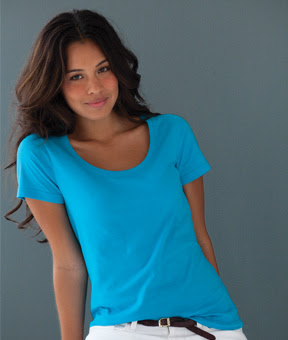| NEWS REPORT / JUST-STYLE |
Anvil: From Sustainable Cotton to Sustainable Business
Sustainability is a defining element of the future of the apparel industry, says Anthony Corsano, CEO of Anvil Knitwear in a report in Just-Style. Firms must find new ways to do business, and new ways to bring products to market that use recycled and sustainable materials, "because you can't possibly believe that the world can continue to consume...and that we'll have the ability to feed and clothe all these people with the resources on this planet."
"That's what takes this whole thing to the next level. While many companies say they're doing it because it's the right thing, they're doing it because they have to. It's the only way they'll be able to be in business ten, 20, 30, 50 years from now."
Anvil Knitwear has been ranked as the world’s sixth largest user of organic cotton and the largest domestic purchaser of US grown organic cotton by Organic Exchange. It is also going to be honoured as a 'top leader in sustainability' by the Foundation for Social Change and United Nations Office for Partnerships (UNOP). On November 18 in New York, The Foundation for Social Change and United Nations Office for Partnerships (UNOP) will recognize Anvil Knitwear as a Top Leader of Change in the sustainability category at the Global Conference for Social Change: Turning Social Responsibility Into Social Action, according to an Anvil press release.
Today, Anvil produces around 2m to 2.5m units a week - around 100m units a year - across both its own Anvil brand (which accounts for around 75% of volume) and private label goods made for major apparel names including Billabong and Disney Stores, reports Just-Style.
More than 20m units, or around one-fifth of output across both Anvil and private label lines, go out with some sustainability component, such as organic cotton, a percentage of organic cotton, recycled polyester, or transitional cotton, which is grown on farms making the switch to organic processes. And of the 25% of business that is private label, 66% or two out of every three shirts features a sustainability element.
Working more closely with suppliers has also been key to Anvil Knitwear's sustainability efforts. Not just yarn suppliers and thread suppliers, but "reaching up and down the chain."
Not only has this allowed changes to be introduced that are affordable, but it also ensures the business only works with suppliers "that we are aligned with philosophically. We have to be stringent about who we do business with."
Corsano says that unlike conventional cotton, which is secured through yarn spinners, he's in direct contact with the organic cotton farmers who supply Anvil, with whom he has established "long-term relationships, real partnerships."
This part of the business is not seeing the wild price swings currently enfolding the conventional cotton trade.
"We have an understanding [with the growers] that organic cotton should trade higher than conventional," he explains, "but we've taken out the ridiculous highs and lows, so we set prices for the year that kind-of track conventional."
"So there's tremendous stability today in comparison to the conventional, and we're able to use that to secure some programs and convince people that the organic aspect can bring more stability to the market."
Read the Full Story: Speaking with style: Anthony Corsano, CEO, Anvil Knitwear
Read the Press Release: Global Conference for Social Change Recognizes Anvil Knitwear as a Top Leader in Sustainability
Photo Credit: Anvil Knitwear


No comments:
Post a Comment